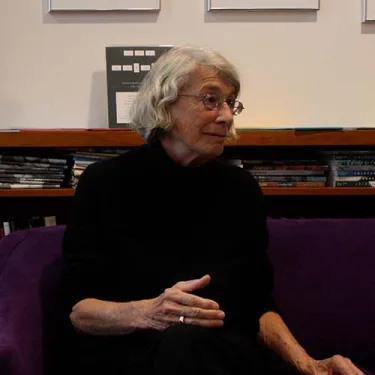Mary Oliver
Visiting Poet

Mary Oliver is renowned and beloved for her evocative and precise rendering of the natural world, offering gorgeous as well as disturbing and brutal images. Her many books-27 at present count-are essential to a wide spectrum of readers the world over.
Alicia Ostriker praises her in The Nation for being “as visionary as Ralph Waldo Emerson,” and among the few American poets who can describe and transmit ecstasy, while retaining a practical awareness of the world as one of predators and prey.” In poems that are rarely populated by humans, Oliver leads us to ask what it is to be human, and to consider what the excesses of civilization have cost us. As Stanley Kunitz has said, her work is fine and deep; it reads like a blessing. Her special gift is to connect us with our sources in the natural world, its beauties and terrors and mysteries and consolations.”
After a National Endowment for the Arts Fellowship, a Shelley Memorial Award, a Guggenheim, and an American Academy and Institute of Arts and Letters Achievement Award, Oliver went on to win the 1984 Pulitzer Prize for American Primitive. That book was followed by Dream Work, House of Light, and New and Selected Poems, winner of the 1992 National Book Award. New & Selected Poems, Volume Two was issued in 2005. Oliver’s most recent collections include Red Bird, an immediate national bestseller upon publication in 2008, and Swan, out in 2010. She has also produced four prose works, Blue Pastures and Winter Hours, a collection of prose, prose poems, and poems, and two books on craft, A Poetry Handbook and Rules for the Dance. In October 2007, Beacon Press published Our World, with text by Oliver accompanying a collection of photos by Molly Malone Cook, her partner for many years, and a pioneer gallery owner and photographer.
Select Poems
Blue and dark-blue
rose and deepest rose
white and pink they
are everywhere in the diligent
cornfield rising and swaying
in their reliable
finery in the little
fling of their bodies their
gear and tackle
all caught up in the cornstalks.
The reaper’s story is the story
of endless work of
work careful and heavy but the
reaper cannot
separate them out there they
are in the story of his life
bright random useless
year after year
taken with the serious tons
weeds without value
humorous beautiful weeds.
From WHITE PINE (Harcourt Brace, 1994)
How necessary it is to have opinions! I think the spotted trout
lilies are satisfied, standing a few inches above the earth. I
think serenity is not something you just find in the world,
like a plum tree, holding up its white petals.
The violets, along the river, are opening their blue faces, like
small dark lanterns.
The green mosses, being so many, are as good as brawny.
How important it is to walk along, not in haste but slowly,
looking at everything and calling out
Yes! No! The
swan, for all his pomp, his robes of grass and petals, wants
only to be allowed to live on the nameless pond. The catbrier
is without fault. The water thrushes, down among the sloppy
rocks, are going crazy with happiness. Imagination is better
than a sharp instrument. To pay attention, this is our endless
and proper work.
From WHITE PINE (Harcourt Brace, 1994)
Down by the rumbling creek and the tall trees—
where I went truant from school three days a week
and therefore broke the record—
there were violets as easy in their lives
as anything you have ever seen
or leaned down to intake the sweet breath of.
Later, when the necessary houses were built
they were gone, and who would give significance
to their absence.
Oh, violets, you did signify, and what shall take
your place?
From EVIDENCE (Beacon Press, 2009)